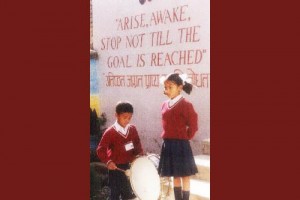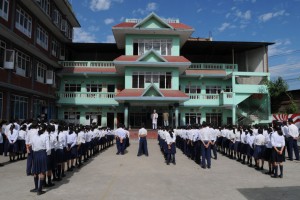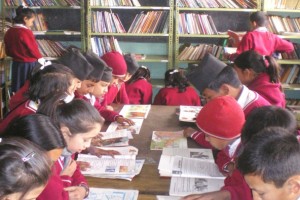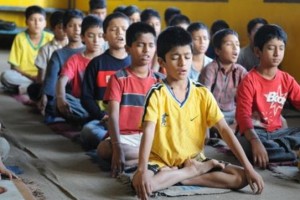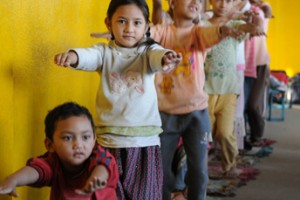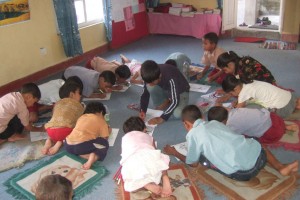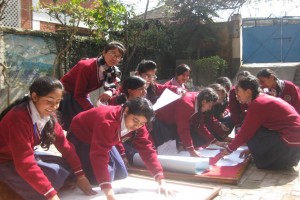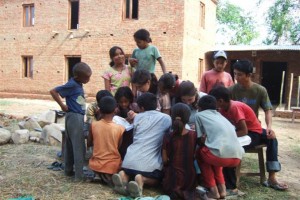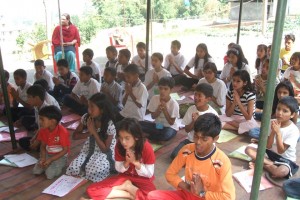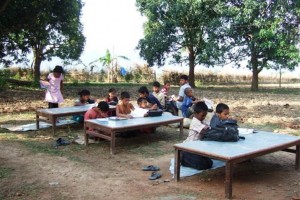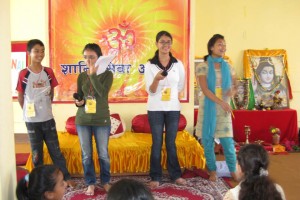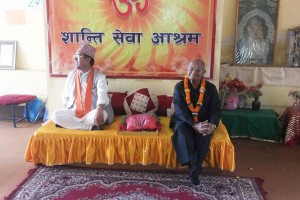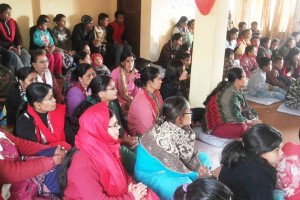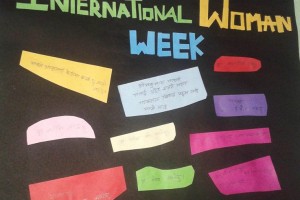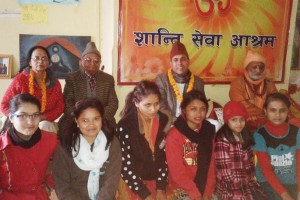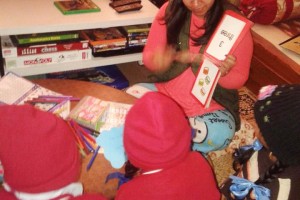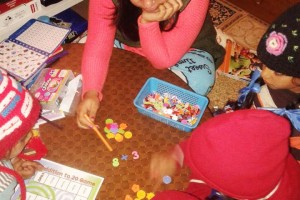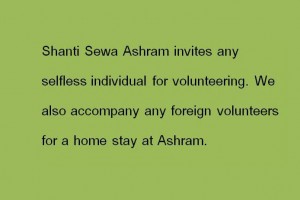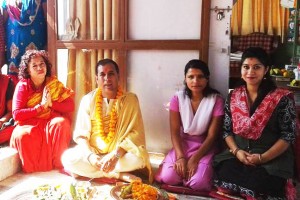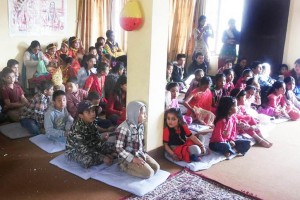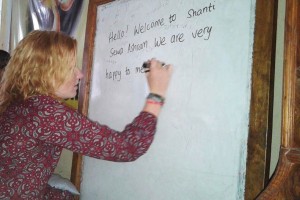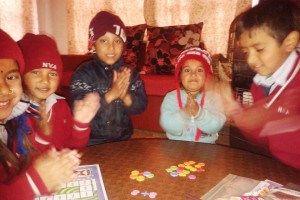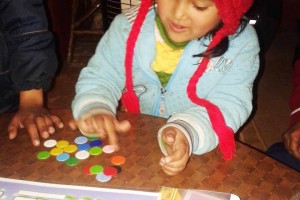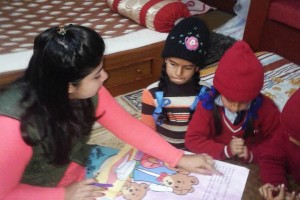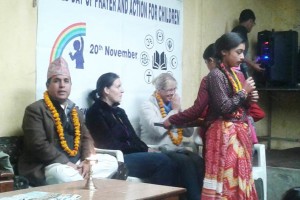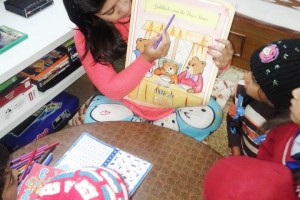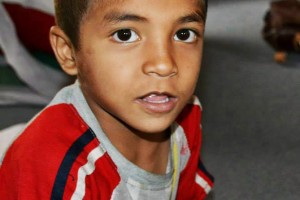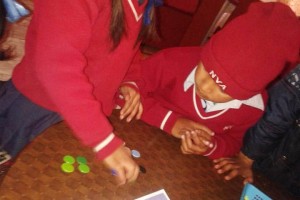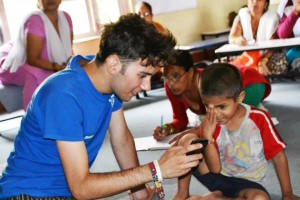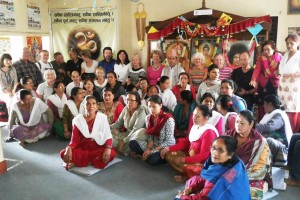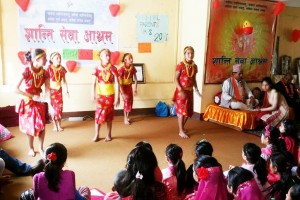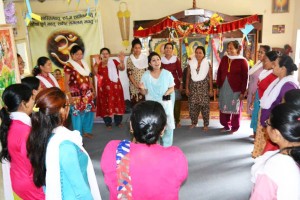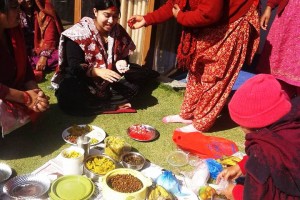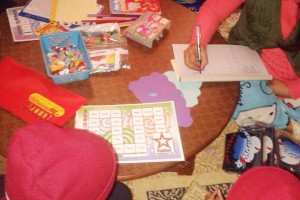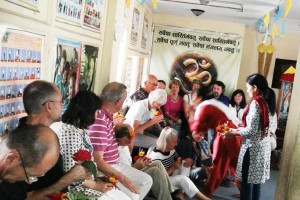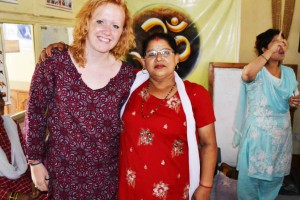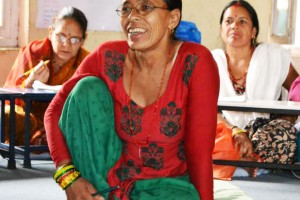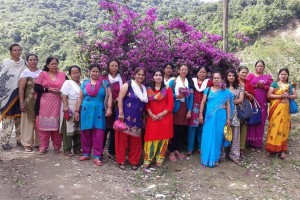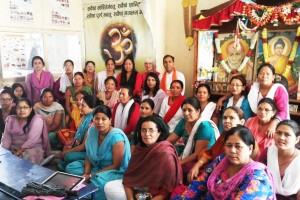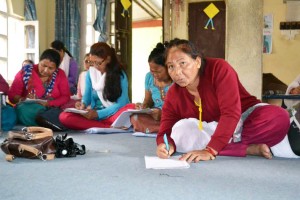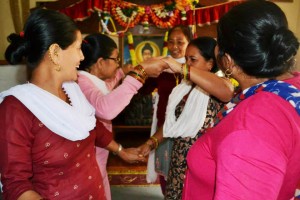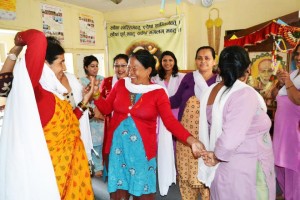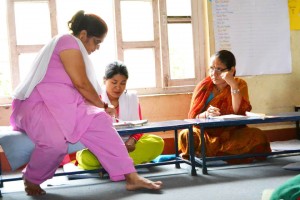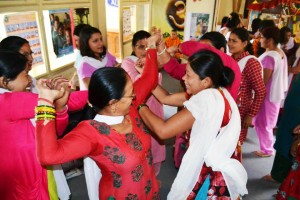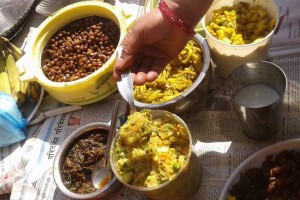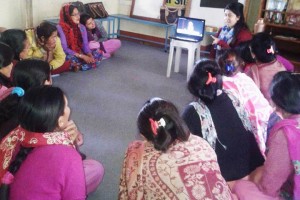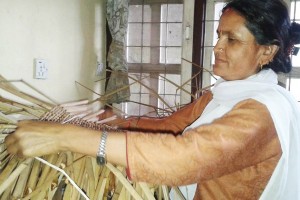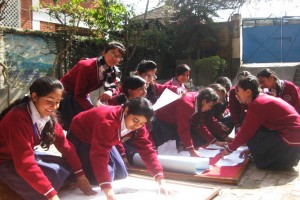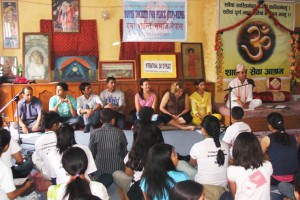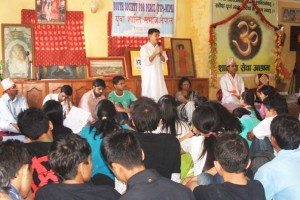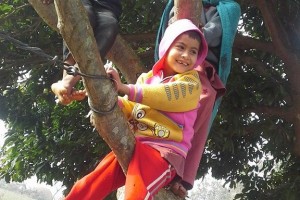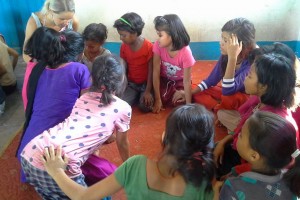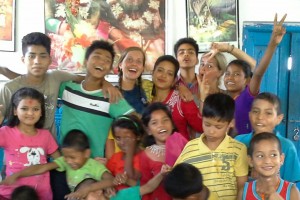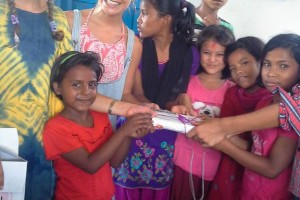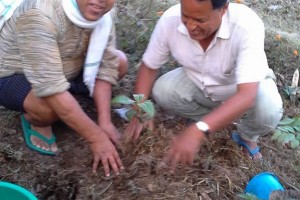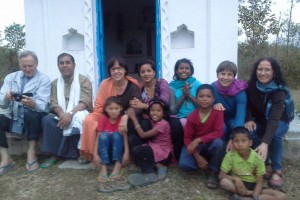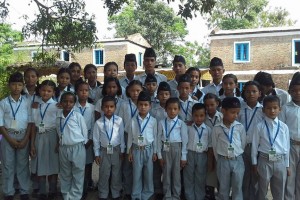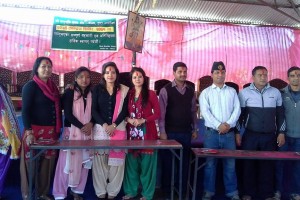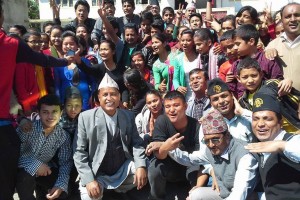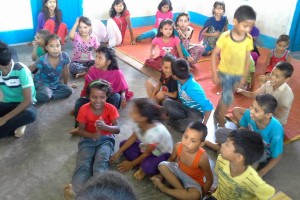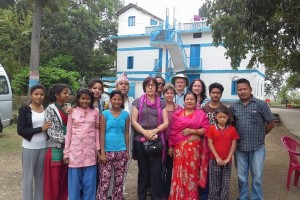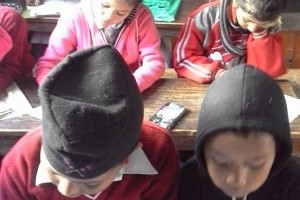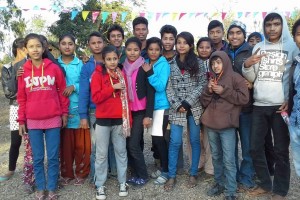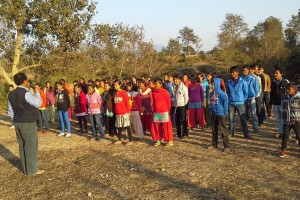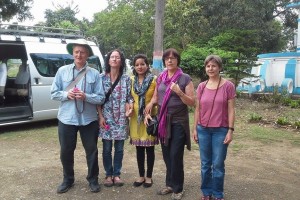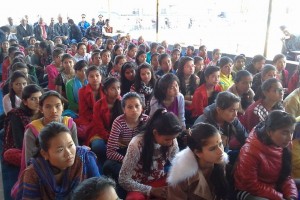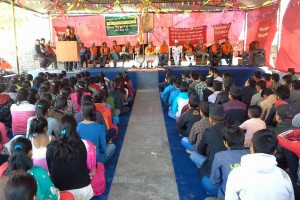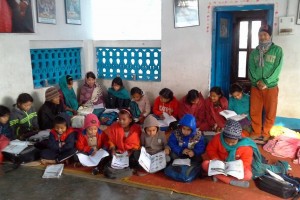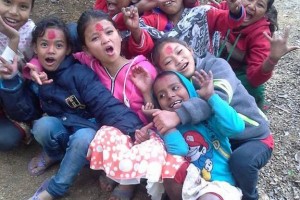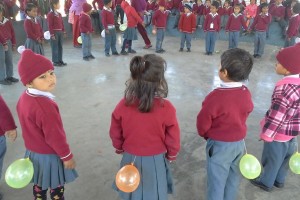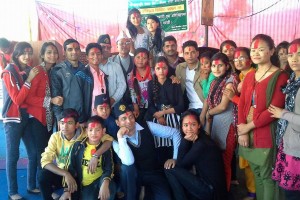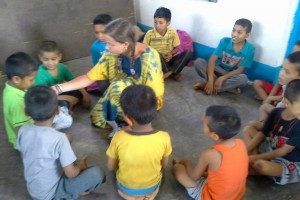Nepal Programs
Hindu Vidyapeeth-Nepal (HVP)
The Hindu Vidyapeeth schools are founded on the belief that an education which promotes both academic excellence and training in spiritual, cultural, and moral values will best equip a child to face life’s challenges and to serve humankind.
Through its holistic education, HVP promotes universal values such as love, peace and service, while also providing each child with a deep knowledge, understanding and love of his/her own culture. HVP was formally inaugurated in 1985 on the auspicious day of Saraswati Pooja (honoring the Goddess of knowledge). Through the hard work and dedication of the founding Principal and coordinator Dr. Chintamani Yogi, HVP now boasts three branches: HVP Central (Lalitpur), HVP Thali, and HVP Dang.
All of the schools teach up to grade 10, and there are plans to extend to 10+2 – a balanced education for a complete human being. The schools are run by the socio-cultural organization, Matribhoomi Sevak Sangh (MSS), founded by the late Dr. Bihari Lal Shrestha, an eminent social worker. MSS is dedicated to the promotion of a society in which each individual has a clear concept of spiritual, cultural, and moral values, as well as an understanding of his/her place and responsibilities in the world. MSS believes in the philosophy of byakti nirman, or creation of the complete person, and for this purpose established the three Hindu Vidyapeeth schools.
- To provide a strong and balanced academic foundation
- To provide spiritual, cultural, and moral awareness
- To promote an awareness of, and sensitivity towards, national and global issues
- To promote a sense of responsibility towards others through an emphasis on civic education
- To provide equal opportunities to all students, regardless of their cultural background
- To create a whole, balanced human for the betterment of society
- Through our dedicated team of well-qualified staff
- Close supervision and evaluation by committee members
- Regular internal student assessment to evaluate progress
- Scholarships/sponsorship for children from the less privileged parts of society
- Education training camps in the districts for staff and children
- Extra classes in moral values
- Greater student-teacher interaction
- Educational trips to places of cultural significance
- Regular dance, music, drama, speech and talent programs and competitions
- Programs and clubs to promote environmental awareness
Our Schools
HVP Central
- Opened 1985 A.D.
- Approximately 450 students
- Hostel for boys: average 25-30 boarders
- Good computer facilities and regular computer classes for all students
- Newly built playground and on-site sports facilities
HVP Thali
- Opened 1989 A.D. (Then called HVP Indrayani)
- Approximately 350 students.
- Set in attractive countryside outside Kathmandu city.
- Its own land available for sport and recreation activities
HVP Dang
- Opened 1991 A.D.
- Approximately 500 students
- Hostel facilities for boys and girls; average 35-40 boarders
- New building set in its own land, available for sport and recreation activities
The government school system in Nepal is free up until class five, however these institutions tend to have poor facilities, insufficient staff, and uncommitted teachers who miss lessons and use outdated teaching methods. In addition, the academic standard achieved at these schools is rarely good enough for a child to gain access to further education, especially as most institutions require the student to have attended an English Medium school previously.
For families too poor to send their child to a private school, government education can seem to be a waste of time, and in many cases as soon as the child is old enough he/she will be withdrawn to work in order to support his/her own living costs. For this reason the full sponsorship of a child is the most valuable and often the only useful contribution that can be made.
Whether or not a child intends to continue academic study beyond school, or even if he/she intends to live a farmer’s life in the rural Nepal tradition, we believe that an education is immensely important to the fully rounded development of a person, and vital to help them fulfill their potential later in life. The emphasis on cultural and spiritual understanding in HVP makes this particularly true, and sponsoring a child can never be considered a waste of money.
HVP sponsors many children internally, providing education at a reduced rate depending on the circumstances of the families and their means of support. HVP Dang in particular offers reduced fees to all disabled students, as well as those from poor backgrounds or lower castes. In addition to these scholarships there are schemes in place whereby the International supporters of HVP provide the means for needy students to be sponsored through their education, and in many cases provided accommodation and meals in hostel. There are sponsored children at all three schools, however priority is given to the Dang school due to the high number of poor families and war-affected children in the surrounding area. Many of these students are sponsored through the kind support of members of HVP-UK, which also plays a key role in coordinating the scheme.
HVPSG-USA also operates two schemes to provide sponsorship for students of HVP, one granting need-based scholarships to students from poor backgrounds, and the other awarding one-year scholarships as prizes to the winners of sport, essay and art competitions. So far 156 students have benefited from these competition-based scholarships, while 10 students at HVP Thali are presently enjoying free education through the Need-based scholarship scheme.
HVP Dang supports children in a variety of different ways, according to their varying needs. Depending on the severity of their circumstances students in the scheme are granted free education, food, books and uniform, and in the case of fully sponsored children, accommodation and full-time care. The number of children sponsored depends entirely on the number of donors, but at the moment over 40 students benefit to some extent, excluding those given reduced fees by the school due to disability. The Dang hostel is mixed and staffed by capable resident male and female teachers. The atmosphere is that of a family home, and provides an extremely supportive environment for a child with inadequate or difficult home circumstances to grow up in.
HOW CAN YOU HELP …
There is a long list of children waiting to benefit from the sponsorship scheme, and for many time is running out if they are to start school at the right age and gain full advantage from their education. Although one-off donations are gratefully received, and will be spent on academic equipment, accommodation costs etc, the most valuable form of support is that of ongoing sponsorship.
Just £10 a month can allow us to provide a complete free education for a child, while £40 a month allows us to completely sponsor a child; providing food, accommodation, uniform and education.
If you cannot afford either of these schemes, why not share the support of a child with a friend or family member?
Any contribution is gratefully accepted. Please try to help us provide education where it is most needed.
Shanti Sewa Ashram (SSA)
Dr. Yogi dreamed of creating a shelter, a place to integrate services and bring together all the social organizations on one platform, present a fantastic example of ecology and spirituality, bridging east and west, connecting nature and culture, and uniting spirituality and humanity.
Shanti Sewa Ashram, translated into English – Peace Service Center, fosters selfless service towards humanity through programs which strengthen the intention of peace, promote interfaith cooperation, non-violence, and spiritual and philosophical awareness.
The SSA was established in Koteshwor, Kathmandu in 2002. Originally purchased with generous donations from the Yogi family, the Community Center/Ashram was initially a simple one floor flat with an area for Satsanga. Today it is a three-level headquarter building and regular meeting place for workshops, conferences, and various other regular programs for all spheres of the community. This development shows heartfelt trust in the abilities of Dr. Yogi who continues to guide the Community Center/Ashram in its vision.
The hope of SSA is that disadvantaged children, women, and elderly people will get holistic services regardless of religion, cast, sex, sect or nationality. SSAS is a big open house where one can get service, prayer, awakening, and enjoyment.
- To encourage everyone to understand and practice peace in their daily lives.
- To help the poor and unfortunate in the society wherever possible.
- To promote a tolerant and value-based Spirituality at every level of society.
- To provide a forum for spiritual and peace-oriented organizations to work together for Peace.
- To help in developing a peaceful society and a better world.
- To work in association with Hindu Vidyapeeth (HVP) in promoting holistic education.
- To bring youth for community service and peace through “Youth Society for Peace.”
- Regular Satsanga and programs which strengthen the intention of peace and promote interfaith co-operation.
- Provides education and skill-based training for women to help them help themselves and their families through Women Empowerment Program (WEP).
- Workshops, Training and discussion groups for Youth Society for Peace (YSP).
- A Children’s Study Center (CSC) evening program, offering free tuition and value-based activities to underprivileged children from a mixture of family backgrounds.
- Saturday morning programs for local underprivileged children: the “Seeds Of Peace” (SOP)
- Encouraging discourse, debate and action with regards to serious social issues such as HIV AIDS, racial disharmony, conflict, violence against women and child abuse.
- International collaboration with other service-based peace organizations across the world as well as local collaboration with similarly-minded groups.
Children Study Center
This project is aimed at helping families within the neighborhood of the Community Center/Ashram. Most of the children come from impoverished families. Here the local girls and boys, who mostly attend surrounding government schools, are provided free after school care and tuition. The program has been successfully running for over 2 years, with around 100 children participating. It runs five days a week from 4pm until 6pm every afternoon except Tuesdays and Fridays. It offers children between the ages of 5 and 15years old a positive structure for a holistic development.
Women’s Education & Empowerment Programs
Following in the footsteps of the hugely successful Children’s Study Club aimed at boosting children’s education and providing a safe-play environment with a positive philosophy, the Community Center/Ashram sought to reach out also to the mothers of these children. To complement the Women’s Training Program (WTP) imparting useful skills, the Community Center/Ashram expanded its services by providing focused education through a Women’s Education Program (WEP).
Within the neighborhood of the Community Center/Ashram, many women never had the opportunity to receive an education. Coming from marginalized communities, they lead hard lives of menial labor, barely managing to maintain a minimum standard of living for themselves and their children. On top of this, many are struggling alone without a husband, or as is also common, with the burden of a violent husband.
The Women’s Education Program has significantly helped uplift the women by giving them greater self esteem, confidence and new job prospects. As additional benefits, the teaching is delivered in a supportive and safe environment, providing positive motivation, counseling and advice for handling the many difficulties.
For the last two years, a qualified volunteer teacher provides classes for two to three hours a day. The program is offering its service free of cost to around 40 women (aged 20 – 60) every day. The main objectives of the classes are:
- Providing women basic literary classes
- Developing their confidence and leadership qualities
- Building awareness about their rights and duties
- Providing counseling classes for their various mental and social problems
- Running classes to enhance basic concepts on maintaining their good health
Youth Society for Peace
Youth Society for Peace (YSP) was established in 2003 in collaboration with the youth of Shanti Sewa Ashram (SSA). In a society that sorely misses the contentment of a peaceful existence, it is becoming increasingly important that the youth of today (who are the leaders of tomorrow) have access to a community of like-minded peers who will mutually nurture their peaceful vision for the future. In this way, YSP hopes to refine and to promote their vision into the wider world and encourage peaceful practices and a sense of social responsibility.
- To help youths understand the importance of peace & to practice it in their daily lives .
- To involve the youths in creative activities by building upon their infinite potential.
- To encourage young people to serve the poorer communities, war victims & orphans.
- To create a global forum of young people from which they can share their problems, skills, experiences & wisdom.
- To help youths to realize their own spirituality and their responsibilities as a human being.
- To spread the message of the Shanti Sewa Ashram (SSA).
- To create and maintain links with other youth organizations such as those we have with Children of the Earth in order to share ideas and visions.
- We will not waste our time & talent by blaming others.
- We will explore peace within ourselves.
- We respect every being beyond caste and creed, sex & sect, colour & faith.
- We will enjoy doing even the smallest things selflessly & peacefully.
- We will never become the tools of any religious or political groups.


